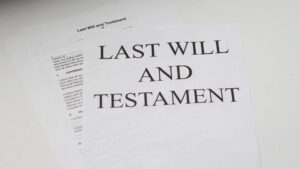Estate planning documents needed regardless of net worth
There are several estate planning documents needed regardless of net worth. For the last few decades, the topic of estate planning has tended to focus on tax minimization. Just the word “estate” can evoke images of wealthy families making heirs “trust fund kids.” However, estate planning has never been primarily about taxes. It’s about enabling the right people to make the right decisions.
According to the Tax Policy Center, only about 1,900 families are expected to pay estate taxes for 2018 due to the latest tax code changes. That is less than one tenth of 1 percent of the 2.7 million people who passed away last year. Thus, estate taxes are not a concern for most families. Still, the need for estate planning and having updated estate planning documents applies to nearly everyone.
Estate planning documents are critical for the living. Why? Because without proper estate planning documents in place while alive, directions regarding who makes certain decisions on one’s behalf may not be carried out.
…without proper estate planning documents in place while alive, directions regarding who makes certain decisions on one’s behalf may not be carried out.
Below is a brief description of the essential estate planning documents. In them, you will see how the benefits of properly executed and updated documents apply regardless of net worth. Even young adults with no assets to speak of should consider executing several of these.
Durable Power of Attorney
Assets owned in the name of an individual can only be managed by that individual. For example, if Bob owns a home only Bob can authorize maintenance work, repairs, or the sale of the property. The same limitation applies if Bob must authorize actions on property he owns in some form of co-ownership.
A Durable Power of Attorney (DPOA) allows Bob to grant authority over certain assets to an agent in the event he is unable or unwilling to do so.
Say Bob falls ill. Without a proper DPOA, no one can exercise the rights of ownership over assets owned solely by Bob without going to court to establish a guardianship, which takes time and can be expensive. Plus, there is no guarantee the court will appoint a guardian Bob would have wanted.
One common scenario where the lack of a DPOA is often a problem is with IRAs and other retirement accounts such as 401(k)s. Bob cannot transfer ownership of retirement accounts to a trust while alive and such accounts cannot be owned jointly with another person. Without a DPOA, even a spouse will have trouble administering the retirement accounts.
Without a DPOA, even a spouse will have trouble administering the retirement accounts.
It is much better that Bob execute, ahead of time, a DPOA specifying what decisions his appointed agent can make on his behalf and the assets covered under the DPOA. In Florida, changes in the law make DPOAs executed before October 1, 2011 weak and possibly invalid, so an update for such older documents is warranted.
Declaration of Pre-need Guardian
Some states, including Florida, permit the filing of a Declaration of Pre-need Guardian. This document tells the court who you want to be your guardian should the need arise. This can be important because there are circumstances in which a guardianship is needed even when a Durable Power of Attorney is in place. For example, it is common for a court to require a supervised guardian should one become incapacitated due to an auto accident and receive a large settlement to be paid into a future medical fund. These also become important should a DPOA or a Health Care Surrogate document be deemed unusable as is sometimes the case when poorly drafted or the agent named is not able or willing to accept the responsibilities of the role.
Health Care Surrogate
Also known as a Health Care Power of Attorney, the Health Care Surrogate document is like a Durable Power of Attorney but instead of dealing with financial affairs, it focuses on health care decisions. Imagine Bob’s children arguing about which of the treatment options his doctor suggested would be best for Bob. Which child should the doctor listen to? Bob’s wishes can be captured in his Health Care Surrogate document.

Living Will
Like the Health Care Surrogate, a Living Will addresses medical issues but it specifically concentrates on end of life wishes. In this document, Bob will outline the conditions under which he does not want doctors to try to keep him alive. This is typically in cases where Bob would be comatose and/or not expected to live if he were not being supported by breathing machines, IVs and the like. It is sometimes crassly referred to as the “pull the plug” document, referring to the life support equipment often used.
A Living Will is not to be confused with a Do Not Resuscitate Order (DNR) which directs medical staff to NOT perform CPR or otherwise attempt to restart a stopped heart.
Last Will & Testament
A Last Will and Testament names a personal representative (aka an “executor” or “executrix” in many states) to administer one’s estate. The terms of the will apply to assets owned by the individual. A will has no effect on any assets while you are alive and no effect on assets at your death which are owned in joint name with a spouse or other person, in trust, or on accounts with a beneficiary designation.
A will has no effect on any assets while you are alive…
Assets subject to a will’s provisions go through the probate process. In fact, one purpose of probate is to prove the validity of a will. Probate proceedings are facilitated through the court systems, require the original copy of the will and are public record. Therefore, in most cases, the planning process usually seeks to minimize the amount of assets covered under a will and subject to probate.

A last will and testament is critical for young adults with children. The document tells the court who parents want to serve as the legal guardian of their minor children in the event they die before the children become legally responsible for themselves.
Beneficiary forms
Beneficiary forms are used with a variety of account types including IRAs, 401(k)s and other retirement accounts, life insurance policies, and annuities. In Florida and some other states, they can be added to bank and brokerage accounts. They have no effect on assets while you are alive.
At your death, by law the assets in an account with a beneficiary designation are distributed to the designated beneficiary without going through probate. Because this ownership transfer happens regardless of what a will or trust document states about the deceased’s wishes, proper beneficiary designations are critical to fulfilling the deceased’s wishes.
Revocable Living Trust
A revocable living trust is a legal device used to own assets and empower a trustee to manage and administer those assets according to the grantor’s wishes. The grantor is the person establishing the trust. Typically, the grantor will serve as trustee of the trust. Because the trust is amendable and revocable, the assets and activity within the trust are taxed the same way they would be had the assets been owned by the individual or jointly with a spouse.
Trusts are the device of choice when sophisticated tax planning is needed, but many people without large tax liabilities find them beneficial too. Trusts are a popular choice because the grantor can very precisely lay out what is to happen with assets should there be an incapacitation or death. It is often easier to manage assets for an incapacitated person via a trust than through a Durable Power of Attorney because the successor trustee need only show they are the legitimate trustee of the assets titled in the name of the trust. An agent under a DPOA often must prove the legitimacy of the DPOA document to the interested party.
Trusts are far and away a better way to manage assets than through a guardianship because no court approval or monitoring is involved.

At your death, the trust can become irrevocable which makes them useful for creditor protection. This is a common concern when an heir is more susceptible to being sued or an heir is married to someone the grantor does not want to have easy access to the heir’s share of assets. The transition at death occurs free of probate and the public record that goes with it.
The primary limitation of such trusts is the trust must be “funded,” meaning assets must be retitled in the name of the trust. If the asset is not owned in the name of the trust, the terms of the trust will not apply.
Planning prevents problems
Many people do not get these documents completed either due to procrastination or because they fear losing control. They may have heard stories about abuse of power by trustees or agents under a power of attorney. It seems like every few weeks the family of a deceased celebrity is fighting over who gets the yacht or the summer home in the Hamptons. In most cases, much of the conflict could have been minimized, even eliminated, if proper documents were in place. If the failure to execute estate planning documents was due to fear of losing control, the irony is the person has lost all the control the law would have given them within the documents.
For those who don’t do any estate planning, they risk leaving decisions about their care and their money to what state law says and what courts determine.
For those who don’t do any estate planning, they risk leaving decisions about their care and their money to what state law says and what courts determine.
We strongly discourage clients from attempting to do these documents using web-based documents or drafting their own. We have seen numerous cases where this has been problematic through errors, oversights or improperly executed documents which were later determined to be null and void.
Please keep your documents up to date. If you have questions, or need help finding a qualified attorney, call us and we’ll help you get your plans in shape.

